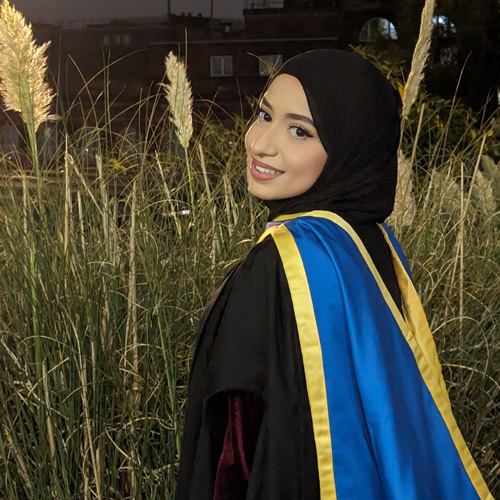MSc Industrial Biotechnology
ApplyKey facts
- Start date: September
- Study mode and duration: 12 months full-time
Work placement: 10-week industry-relevant placement
Number of places on course: 35
Study with us
- for recent graduates and early-career professionals with a variety of backgrounds, from the UK and overseas, all with a common desire to be challenged and with a real passion for industrial biotechnology
- the course is designed to respond to industry needs and is at the forefront of developments in biotechnology
- undertake a 10-week placement and research project
- benefit from the expertise of staff from academic institutions across Scotland and industry partners
The Place of Useful Learning
UK University of the Year
Daily Mail University of the Year Awards 2026
Scottish University of the Year
The Sunday Times' Good University Guide 2026
Why this course?
The MSc Industrial Biotechnology will appeal to those with a primary industrial background as a further training opportunity and as a means of becoming involved in this important field, as well as being suitable for recent graduates and early-career professionals from a variety of backgrounds.
The course has been designed in direct response to industry needs and is at the forefront of developments in biotechnology and engineering. Course content is informed by industry and reviewed annually to ensure it's up-to-date and optimally aligned to the rapidly growing industrial biotechnology sector.
This unique MSc degree is awarded by the University of Strathclyde; teaching takes place at Strathclyde’s campus in Glasgow and the following higher education institutions across Scotland:
- Abertay University
- Glasgow Caledonian University
- Heriot-Watt University
- Innogen Institute
- Scottish Association for Marine Science
- University of Edinburgh
- University of Glasgow
- University of the Highlands and Islands
Teaching on the course combines the expertise of staff from a wide range of academic institutions.
Course video
Watch our video to hear more about the course:

What you’ll study
The course includes a range of compulsory core classes and electives which ensure you'll have the opportunity to specialise for your preferred career path. The degree culminates in a minimum 10-week placement during which you'll carry out an industry-relevant project.
Learning & teaching
Two semesters of formal teaching are followed by an intensive, industry-relevant research project, carried out with an industrial partner or at the University of Strathclyde.
Assessment
The assessment will be based on performance in exams, coursework and the research project.
Facilities
The Strathclyde Institute of Pharmacy & Biomedical Sciences (SIPBS) is a major research centre in Scotland and is among the UK's top schools of pharmacy. We offer an excellent environment for research and teaching, located in a state-of the art building with laboratories fitted with modern equipment.
Athena SWAN Award
SIPBS received an Athena SWAN Bronze Departmental Award in recognition of practices which support gender equality in higher education.
Work placement
The Masters degree culminates in a minimum 10-week placement which enables you to carry out an industrially-relevant project. This is an opportunity to develop specialist knowledge in an emerging technology and increase your employability.
Students have successfully completed industrial placements with companies such as ScotBio, Ingenza, GSK, Fujifilm Diosynth Biotechnologies, Devro and AskBio.
The course content and invaluable experience gained at my industrial placement with FUJIFILM Diosynth Biotechnologies UK (FDBK) really opened my eyes to working in the biopharmaceutical sector. This training also led directly to my current PhD studies in collaboration with FDBK.
MSc Industrial Biotechnology Graduate

Industrial Biotechnology addresses the needs of mankind for the future and with its great diversity offers opportunities for many to contribute. The MSc Industrial Biotechnology is the portal to start your journey.
Course Director
Compulsory modules
Introduction to Bioinformatics (University of Strathclyde)
10 credits
This core module provides key concepts, knowledge, and understanding around bioinformatics and computational biology. It enables you to understand how biological data is represented computationally, and how it can be integrated and analysed to inform their research and practice in industry. It is a highly practical course emphasising direct application of techniques. Its content and structure have been informed by teaching and learning theories to make its content evidence-based, using the same tools and datasets that bioinformatics practitioners and researchers use in their day-to-day roles.
There will be a series of ten lectures delivered in a partially flipped format. You will be expected to read the corresponding material and attempt exercises ahead of the lecture. The lecture will cover the main points of each topic, with time for questions and discussion. You will attend five on-campus practical computational laboratory sessions. The sessions will be run using the python and mysql software. In some cases you may be expected to complete pre-laboratory requirements (for example, quizzes or other formative exercises).
You will complete two coursework projects, the first integrating material from the first half of the module, and the second integrating material across the entire module.
There will be a series of five tutorials before practical labs. These tutorials will act as a bridge between theory and practice. You will learn what programming features, libraries and platforms are there for bioinformatics tools and how that can be linked with theory covered in lectures.
Big Data Fundamentals (University of Strathclyde)
10 credits
This modules aims to provide:
- an understanding of the new challenges posed by the advent for big data, as they refer to its modelling, storage, and access; and
- an understanding of the key algorithms and techniques which are embodied in data analytics solutions
Applied Biocatalysis (University of Strathclyde)
20 credits
Applied Biocatalysis is a core technology in Industrial Biotechnology, covering the use of enzymes and related materials as catalysts in industrial processes. It complements fermentation as presented in the bioprocessing class, where whole cells are the catalysts – indeed the two form a continuous spectrum of technologies.
This module will provide you with the following learning objectives:
- understand the range of approaches available for finding new enzymes
- appreciate the key properties required in a practical biocatalyst and how they can be obtained
- appreciate the scope of biocatalysis and how it can integrate with synthetic chemistry
- understand how the kinetics of enzymatic processes can be modelled and analysed
- understand the principles of the immobilisation of enzymes and whole cells
- appreciate key issues in industrial enzyme manufacture, trade and application
Elective modules
Renewable Energy Technologies (Abertay University)
20 credits
This module covers advanced aspects of the science, technology and socio-economic aspects of renewable energy production, with a particular emphasis on biofuels.
The aim of this module is to provide you with an understanding of chemical, biochemical, microbiological and process engineering aspects of renewable energy production. This module will help you to:
- Critically appraise current/future status of renewable energy
- Evaluate biotechnology research in novel biofuel processes
- Evaluate renewable energy production with regard to:
- human health
- climate change
- energy security
Project Management (University of Strathclyde)
10 credits
Project management and project-based organisations are becoming increasingly common in industry, therefore this module assumes that you require some knowledge of the tools and techniques used to manage projects within organisations. Those with no background in project management will be introduced to:
- the concept of the project lifecycle
- project management as a strategic tool
- the methodologies and tools that enable efficient project execution
Food Microbiology and Biotechnology (Glasgow Caledonian University)
10 credits
This module will provide you with personal transferable graduate skills in areas of food microbiology and biotechnology. You'll develop critical data analysis skills, laboratory skills including report writing and data generation. Additionally, you'll develop your literature searching, and essay writing skills.
This class covers:
- Production of Biofuels & Bioplastics
- Generation of Recombinant Proteins & Cell Factories
- Fermentation Technology
- Foods and Beverages Production
- Plant Transgenics & Bioremediation
- Bacteriophage in Food Industry
Compulsory modules
Bioprocessing (University of Strathclyde)
20 credits
Bioprocessing is a key skill in Industrial Biotechnology and therefore this module underpins the whole course. Bioprocessing forms the basis of the production end of the biotechnology business.
You'll gain an understanding of the:
- basic principles of bioprocessing including process kinetics
- importance of and mechanisms for strain/cell line stability and preservation
- importance of medium design, bioreactor design and operation
- principles of mass transfer and its relationship to the success of bioprocesses
- principles of good manufacturing practice and its relevance to regulatory issues
- skills in data/paper interpretation and writing
Synthetic Biology (University of Glasgow)
20 credits
This module explores the concepts of rational design, computer modelling, construction and characterisation of synthetic biology systems and devices. You'll have the opportunity to design, build and test a simple genetic circuit or metabolic pathway, and to plan a more complex synthetic biology project.
Downstream Processing (Heriot Watt University)
10 credits
Downstream processing refers to the recovery and purification of biosynthetic products from natural sources such as animal or plant tissue or fermentation broth, including the recycling of salvageable components and the proper treatment and disposal of waste. It's an essential step in many manufacturing processes.
You'll gain an understanding of:
- downstream separation techniques
- capture and purification operations
- influence of product type on separations
- cell disruption operations
- centrifugation, membrane separations and chromatographic applications
Elective modules
Circular Economy and Transformations Towards Sustainability (University of Strathclyde)
10 credits
The module introduces you to the circular economy as a systems-based concept in which production is designed to be restorative and resilient, while waste is designed out of the system. Circular economy is thus featured as a reaction to the conventional dispensation of the linear ‘make-use-dispose’ economy, and as a framework for the development and management of a sustainable, ‘waste as a resource’ economic system.
Understanding the Regulatory Environment of Bioprocessing Industries (Glasgow Caledonian University)
10 credits
You'll develop critical data analysis skills and laboratory skills, including report writing and data generation. You'll also develop skills in reflective and experiential learning and effective use of learning resources.
This class covers:
- principles of quality management schemes
- understanding the role of accreditation systems in processing industries: focus on food & drink manufacturing
- Hazard Analysis Critical Control Points (HACCP)
- analytical lab skills
Food Commodities and Sustainability (Glasgow Caledonian University)
10 credits
This module will provide you with personal transferable graduate skills in areas of analysis of foods, report writing and data generation. Additionally, you'll develop your literature searching, critical analysis and essay writing skills.
This class covers:
- global food commodities
- food sustainability and food security
- utilisation of waste streams
- developing circular economies
Blue Biotechnology (The Scottish Association for Marine Science, University of the Highlands & Islands)
20 credits
This module combines taught and practical elements and covers topics such as taxonomy, systematics and physiology or micro-algae and macro-algae.
The emphasis will be on the biotechnological exploitation of these organisms focussing on their use as human/animal food; hydrocolloids, fine chemicals; green fertilizers and as feedstock to produce algal biofuels. Issues such as the environmental impacts of macro-algal farms, disease susceptibility and techno-economics will be covered.
Industrial Biotechnology Research Project
The project will be typically based with one of the Industrial Biotechnology Innovation Centre’s industrial partners and be supervised by both an industrial and academic supervisor. The placement will last a minimum of 10 weeks, and you'll usually be based in industry working on an industry-relevant project gaining invaluable experience in a key area of biotechnology.

Exposure to industry is also another great thing about the course, achieved by bringing in guest lecturers who are professionals in the field and an industrial placement.
MSc Industrial Biotechnology graduate
Entry requirements
| Academic requirements/experience | Minimum upper second-class (2:1) Honours degree or international equivalent in:
or related subjects. Prospective students with relevant experience or other appropriate qualifications are also welcome to apply. |
|---|---|
| English language requirements | You must have an English language minimum score of IELTS 6.5 (with no component below 6.0). We offer comprehensive English language courses for students whose IELTS scores are below 6.5. Please see ELTD for full details. As a university, we now accept many more English language tests in addition to IELTS for overseas applicants, for example, TOEFL and PTE Cambridge. View the full list of accepted English language tests here. |
International students
We've a thriving international community with students coming here to study from over 140 countries across the world. Find out all you need to know about studying in Glasgow at Strathclyde and hear from students about their experiences.

Fees & funding
All fees quoted are for full-time courses and per academic year unless stated otherwise.
Fees may be subject to updates to maintain accuracy. Tuition fees will be notified in your offer letter.
All fees are in £ sterling, unless otherwise stated, and may be subject to revision.
Annual revision of fees
Students on programmes of study of more than one year (or studying standalone modules) should be aware that the majority of fees will increase annually.
The University will take a range of factors into account, including, but not limited to, UK inflation, changes in delivery costs and changes in Scottish and/or UK Government funding. Changes in fees will be published on the University website in October each year for the following year of study and any annual increase will be capped at a maximum of 10% per year. This cap will apply to fees from 2026/27 onwards, which will not increase by more than 10% from the previous year for continuing students.
| Scotland | £12,550 |
|---|---|
| England, Wales & Northern Ireland | £12,550 |
| Republic of Ireland |
If you are an Irish citizen and have been ordinary resident in the Republic of Ireland for the three years prior to the relevant date, and will be coming to Scotland for Educational purposes only, you will meet the criteria of England, Wales & Northern Ireland fee status. For more information and advice on tuition fee status, you can visit the UKCISA - International student advice and guidance - Scotland: fee status webpage. Find out more about the University of Strathclyde's fee assessments process. |
| International | £32,900 |
| Available scholarships | Take a look at our scholarships search for funding opportunities. |
| Additional costs | Course materials You will have to pay extra for your lab coat and safety goggles. All recommended textbooks are available in the library (and some freely available as online resources). However you may wish to purchase your own copies. Other costs There are returnable deposits for entry keycards and lockers (depending on your project location within Strathclyde Institute of Pharmacy & Biomedical Sciences). International students If you are an international student, you may have associated visa and immigration costs. Please see student visa guidance for more information. |
Please note: the fees shown are annual and may be subject to an increase each year. Find out more about fees.

I currently work for Merck at their Contract Testing Service site in Glasgow. This is a role that required me to have excellent education in biotechnology, so my time at Strathclyde is already helping me to achieve my goals.
MSc Industrial Biotechnology graduate
How can I fund my course?
Scottish postgraduate students
Scottish postgraduate students may be able to apply for support from the Student Awards Agency Scotland (SAAS). The support is in the form of a tuition fee loan and for eligible students, a living cost loan. Find out more about the support and how to apply.
Don’t forget to check our scholarship search for more help with fees and funding.
Students coming from England
Students ordinarily resident in England may be to apply for postgraduate support from Student Finance England. The support is a loan of up to £10,280 which can be used for both tuition fees and living costs. Find out more about the support and how to apply.
Don’t forget to check our scholarship search for more help with fees and funding.
Students coming from Wales
Students ordinarily resident in Wales may be to apply for postgraduate support from Student Finance Wales. The support is a loan of up to £10,280 which can be used for both tuition fees and living costs. Find out more about the support and how to apply.
Don’t forget to check our scholarship search for more help with fees and funding.
Students coming from Northern Ireland
Postgraduate students who are ordinarily resident in Northern Ireland may be able to apply for support from Student Finance Northern Ireland. The support is a tuition fee loan of up to £5,500. Find out more about the support and how to apply.
Don’t forget to check our scholarship search for more help with fees and funding.
International students
We've a large range of scholarships available to help you fund your studies. Check our scholarship search for more help with fees and funding.

During my industrial placement, I specialised as a fermentation scientist, gaining extensive hands-on experience in laboratory techniques and industrial processes. This experience was instrumental in kickstarting my career.
MSc Industrial Biotechnology graduate
Careers
The course provides an exciting opportunity for science and engineering graduates who are looking for a career in an emerging industry that is sustainable, green and essential to the global economy.
Our graduates are currently working in the following industries and organisations:
- GSK
- MiAlgae
- ScotBio
- Enough Ltd
- Roslin CT
- Fujifilm Diosynth Biotechnologies
- Xanthella
- Roslin CT
- Lonza
- Qnostics
As a result of the MSc experience and particularly the industrial placement, the majority of our recent cohorts have secured full-time jobs within the biotechnology sector or have undertaken further postgraduate study.
I was pleased to be offered a permanent role as a Bioprocess Engineer with ScotBio following my industrial placement, and I now lead on the downstream processing part of their production.
MSc Industrial Biotechnology Graduate
Apply
Students eligible to pay tuition fees at the Scotland fee rate
Up to 30 places are available for Scotland fee rate-paying students on the MSc Industrial Biotechnology each year.
We are delighted to have been awarded up to 30 fully-funded places for this programme by the Scottish Funding Council. The fully-funded places will be available for Scotland fee rate-paying students starting in September 2025.
Applicants who receive an offer of admission
To reserve a place on the MSc Industrial Biotechnology, applicants who have been made an offer of admission will be required to accept their offer within 21 days.
Students eligible to pay tuition fees at the International or Rest of UK fee rate
Five places are available for international or Rest of UK fee paying students on the MSc Industrial Biotechnology each year.
There is high demand for these places and once they have been filled, qualified applicants will be placed on a waiting list to be considered for an offer of admission if any places become available. We recommend applying early in the application cycle.
Please ensure you include all supporting documentation before submitting your application to avoid a delay in processing your application.
Applicants who receive an offer of admission
To reserve a place on the MSc Industrial Biotechnology, applicants who have been made an offer of admission will be required to:
- accept their offer within 21 days.
- pay a deposit or provide evidence of a valid scholarship/ sponsorship, within 21 days of accepting their offer. Confirmation of the value of the deposit will be confirmed in the applicant’s offer letter.
Start date: Sep 2026
Industrial Biotechnology (IBioIC)
Contact us
Glasgow is Scotland's biggest & most cosmopolitan city
Our campus is based right in the very heart of Glasgow. We're in the city centre, next to the Merchant City, both of which are great locations for sightseeing, shopping and socialising alongside your studies.
Have you considered?
We've a range of postgraduate taught and Masters courses similar to this one which may also be of interest.

